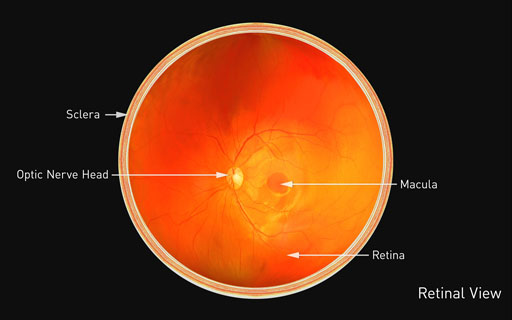Retinal Care
 Retinal disease can be devastating to the eye, and often affects your vision. At the first sign of any visual disturbance, including flashes, floaters, a curtain over your eye, or the sudden or gradual onset of blurred vision, your eye doctor should be consulted immediately.
Retinal disease can be devastating to the eye, and often affects your vision. At the first sign of any visual disturbance, including flashes, floaters, a curtain over your eye, or the sudden or gradual onset of blurred vision, your eye doctor should be consulted immediately.
The retina is the film in the back of the eye that light rays and images are focused on. Tiny photoreceptor cells pick up those images and transmit them to electrical impulses that are sent via the optic nerve to the brain, where visual images are interpreted. The center of the retina is called the macula.
This is the most sensitive area of the retina used for reading vision and straight-ahead vision. Retinal and specifically macular diseases can cause clouding and distortion of vision, loss of peripheral vision, and eventually blindness. There are many types of retinal disease.
Symptoms of retinal disease:
- Any condition that disturbs the center of the retina, called the macula, will result in the onset of blurred vision. Sometimes the subtle vision loss is difficult to detect unless you happen to close the good eye.
- Waviness when looking at straight lines, such as a grid-like this one
- A curtain coming over your vision, from above, below, or either side
- Flashes of light in your side vision, especially noticeable at night
- Floaters, cobwebs, or worm-like shadows that move as you move your eye, especially noticeable against a solid blue or white background
Causes of retinal disease:
- Infection: Bacterial, fungal, and viral infections
- Age: Aging processes can affect the macula, the very center and most sensitive part of the retina
- Heredity: there are conditions such as retinal dystrophies that cause night vision loss, color vision loss, light sensitivity, or generalized blur from a young age. Their conditions are often progressive.
- Eye trauma
- Certain systemic diseases, like diabetes or hypertension
Diagnosing retinal disease:
Your eye doctor can check for chronic conditions like macular degeneration and diabetic eye changes (retinopathy) by doing a complete eye exam, which includes dilation and examination using special magnifying instruments. Photographs may be taken, a dye test such as fluorescein angiography can be performed to determine leakage of blood vessels. Your doctor may also order an OCT scan of the eye, your doctor can detect signs of elevation, fluid accumulation, scarring, or membrane formation.
Treatment for retinal disease:
There are a variety of treatments for retinal disease, ranging from preventative therapy with vitamins to surgery for retinal detachment that is either done in the office or the hospital to laser treatment for diabetes to seal leaky blood vessels, and injections such as LUCENTIS® and Avastin® to stop abnormal blood vessels from growing in the retina and doing damage to central vision.

